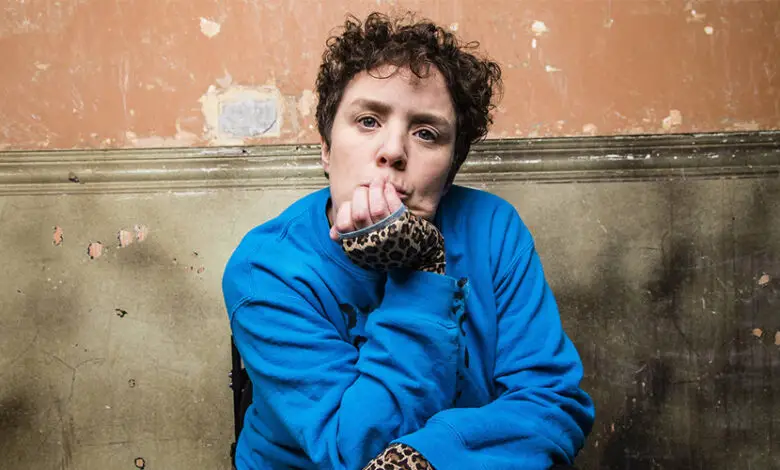
Jess Thom: changing the narrative about Tourette’s
Jess Thom is a British theatre-maker and comedian who lives with Tourette’s syndrome, a neurological condition that causes involuntary movements, words and sounds.
Our writer, Emma Purcell, spoke to Jess Thom about living with Tourette’s, her creative project Touretteshero and her appearances on stage and screen.
Jess Thom is a 41-year-old artist, performer, comedian and disability activist. She was diagnosed with Tourette’s syndrome in her early twenties and has a variety of verbal and motor tics.
She established Touretteshero, an alter-ego and creative space aimed at increasing awareness of the neurological condition. The project includes an online platform where Jess shares her experiences and she hosts events and performances for disabled and neurodivergent people to participate in.
Jess created and starred in the production Backstage in Biscuit Land, which highlights her experiences of living with Tourette’s and the unpredictability it brings. It featured at the Edinburgh Fringe Festival and toured nationally and internationally.
A TV adaptation of the show – Broadcast from Biscuit Land – was later commissioned and aired on BBC Four.
Jess also campaigns for more relaxed performances in theatres for neurodivergent people. In 2017, she starred as Mouth in a rendition of Samuel Beckett’s play Not I. BBC Two also commissioned Jess to appear in a documentary called Me, My Mouth and I, which went behind the scenes of the Not I production.
Jess also made appearances on TV to talk about life with Tourette’s, which included a memorable interview on Russell Howard’s Good News.
Read on to find out more about Jess in her own words.
View this post on Instagram
Jess Thom on living with Tourette’s syndrome
What was it like growing up with tics before your diagnosis?
I’ve had tics since I was six, but they were much less noticeable to other people than they’re now. They intensified in my twenties and began to have a much bigger impact on my life.
But as a child, I knew they were there and I behaved in unusual ways. I made noises and movements that I didn’t choose to do. But the reasons I thought as to why it was happening were way worse than the reality.
Before my diagnosis, I was generally well supported and understood but I did have these internalised ideas and shame that became established early on. I very quickly learnt that the way that my body and brain worked was different to other people and something that other people found problematic.
So getting a diagnosis in early adulthood felt like a relief and crucial in getting the right support, understanding something that has always been a big part of who I am, and having a clear way of explaining it to other people.
How does Tourette’s syndrome affect you on a daily basis?
Tourette’s is a neurological condition that goes up and down in the course of someone’s life. Everybody with Tourette’s will have at least one vocal tic and multiple motor tics.
Vocal tics are involuntary noises that can be words or sentences, but they can also be sounds, throat clearing or sniffing.
Involuntary movements can be similarly complex or simple. I’ve got tics in my legs that affect my mobility. I’ve also got a chest banging tic, which means that I bang my chest hundreds of times a day.
I use a wheelchair to get around and I need to use lots of adapted equipment and aids. I’m a big fan of practical interventions because tics change, and if I get a new tic, I work out what things might help make it easier to manage.
View this post on Instagram
I also have PA support 24 hours a day because I experience episodes where my tics suddenly intensify and I completely lose control of my body and speech.
But all of those things are about how my body and brain work. They have their impacts and they are manageable. The thing that is most difficult to manage is non-accessible environments and attitudes.
What has been the most difficult situation you’ve encountered when facing accessibility barriers or people’s attitudes?
The most difficult situations are not so much about people staring, laughing or being surprised by my tics, it’s people who do not listen once I’ve explained them. This occurs particularly with people in positions of authority and power such as the police or railway staff.
I had a distressing incident years ago when someone refused to let me through a barrier because of my tics and they wouldn’t help me until I stopped swearing. The thing that upset me was the fact that I wasn’t listened to even though I explained.
Your most common verbal tics are “biscuits” and “hedgehog”. Do you love/hate biscuits and/or hedgehogs?
I’ve had no traumatic experiences with either hedgehogs or biscuits. I don’t have any strong feelings on either. I don’t choose my tics. They turn up and sometimes creep in gradually.
Biscuit was a grower that increased slowly over time. But hedgehog just exploded one night. I went out for an evening and wasn’t saying hedgehog. When I came back, I was saying it a lot for no reason. Most tics are random and a surprise to me and everybody else.
I can have more one-off complex, funny tics that can be surreal, like “replace every chimley in London with a penguin” or “the history of iguanas can be written in the teapot”.
I’ve learnt to love and value the way that my brain collides ideas together to create spontaneous new concepts and that is powerful.
What have been the most outrageous/ridiculous tics you’ve said in the most inappropriate place?
While most tics are random, lots of people with Tourette’s have oppositional impulses – so doing or saying the worst thing in any given situation.
It means that I’m rubbish at playing I Spy because I will immediately say the answer. I will also shout “bomb” in airports or tell security I have a springer spaniel in my bag. It’s the very opposite of what you would choose or want to say.
They are also tics that people can find difficult to think are involuntary because they are in context as it involves doing the opposite of what you would want to or choose to say.
I am one of the 10% of people with Tourette’s who have swear tics and often people expect that to be the most tricky aspect.
Actually, I used to work with children and young people for a long time, and I had a regular tic, “I’m a baby”. It’s hard to be strict with a 15-year-old while saying “I’m a baby” over and over again, although I did manage it.
Another tic I had for a long time was “I love cats”. But I didn’t really love cats. Then this cat (who is currently on my lap) came to live with me, despite the fact I had a whole bit of my comedy routine where I said that I didn’t love cats.
I remember practising it with him on my lap thinking, “you’ve just wrecked this whole bit for me. I can’t now say that I don’t love cats”.
One of my earliest long complex tics in my early twenties was “Tony Blair sucks cock through his tiny mouth mother f****** c**”, which is both long complex and rude. But I said it as frequently as biscuits, so it was a very regular set of tics.
Jess Thom on launching Touretteshero
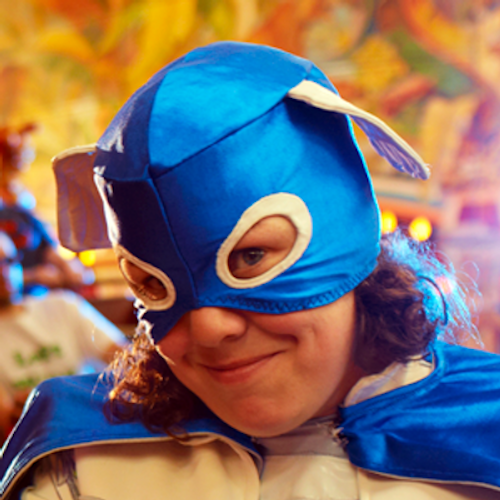
How did you come up with the idea of Touretteshero?
I didn’t come up with the idea of Touretteshero. My colleague and friend Matthew Pountney did. Matthew and I had worked together for a long time on inclusive adventure playgrounds for children.
Over that time, my tics had intensified and Matthew had been one of the few people whom I was close to and who was a key support as I adapted and adjusted to my changing requirements.
We had lots of conversations about Tourette’s and tics, but I would find them difficult and it would often end in tears. Then one day, we had a conversation that radically changed the way I thought about my tics.
He described Tourette’s as a “crazy language generating machine” and told me that not doing something creative with it would be wasteful.
I was able to hear that sentence in a totally different way from anything I’ve heard before. It got into my head, took roots and allowed me to understand and think about the value of Tourette tics creativity and what happens if I let myself think about that in positive ways.
That was Touretteshero’s origin story. That conversation was the starting point of me embracing creativity and Matthew being part of that and together we co-founded Touretteshero as a creative response to my experiences.
I think the other reason why it felt important was that I didn’t find anything that represented the reality of living with Tourette’s. There were formal charitable support organisations and there was information on the medical definitions and descriptions, but there was nothing that reflected the weirdness, the complexity, the humour or the surrealness of living with a body and brain that worked in unpredictable ways.
Which blog posts have been your most popular?
The blog covers a very vast ray of things. Some things are serious, funny and political. One of the things that are interesting to me that I’ve learnt to value is that Tourette’s draws my attention to details in my surroundings that I wouldn’t otherwise notice.
For example, I have this ongoing relationship with the lamppost that I can see from my bedroom window. I’ve written quite a lot about the relationship with that lamppost. My bedtime routine is usually to brush my teeth, get into bed and then shout at the lamppost until I fall asleep.
Those lamppost blog entries are very popular and people like following that relationship because it’s unusual. They’re amongst my favourites too because they explore how tics relate to the environment and then how they draw things that I haven’t consciously been aware of that get highlighted to me through my unusual neurology.
Other popular posts are ones that speak to parents raising children with Tourette’s. As an adult who has the language and confidence to explain what’s happening to me, I’m in a position to share that with families to help them be better allies to their children.
What kind of events do you do for children and young people?
I would describe myself as a performer and participatory artist, which means that lots of the art we make is about collaboration and people coming together.
We create playful, imaginative, inclusive events that invite people to come and be in public spaces and have their access requirements met.
There’s real power in connecting people and creating new ideas. It brings joy and the ability to embrace and enjoy the art activism and the thinking that comes from disabled people.
Also, one of the reasons we hold events for children and young people is because from an early age, disabled and neurodivergent children are taught to expect less and they have to change themselves to fit in.
Often we are taught to feel like we are the problem but we can create spaces where people know that it doesn’t have to be that way.
I think raising expectations and helping you understand that lots of the barriers that we experience are not caused by our bodies or minds, but the cause of decisions largely made by non-disabled people.
Jess Thom on starring in Backstage in Biscuit Land
Can you tell us how you created the show Backstage in Biscuit Land and what it is about?
It was inspired by a difficult experience I had at the theatre. I’d gone to see a show and I’d done all the preparation, talking to the theatre and meeting with the performer who introduced me to the whole audience at the start of the show and explained that I had Tourette’s.
Despite all of that planning, at the interval, I was asked to move and sit separately in a sound booth behind glass at the side of the stage. It was a deeply distressing experience. I sobbed in the booth and promised myself that I would never set foot in a theatre again.
I was supported again by Matthew and other creative organisations, to understand that there was a different option and that was to occupy the only seat in the house – the stage. So I made a show about my experiences.
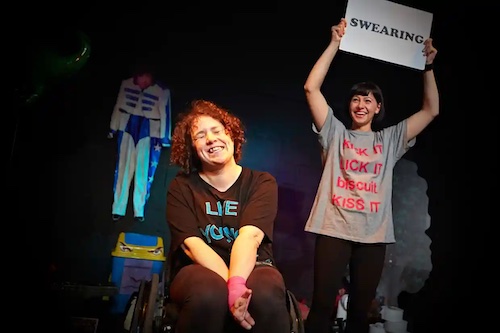
Along with Matthew and my co-performer, Jess Mable Jones, who’s an amazing performer, puppeteer and theatre-maker, we created Backstage in Biscuit Land, a show in which I describe the surreal world my tics create around me.
It was a joyful and challenging comedy. It felt really exciting to think about how we create a live performance that says the things that we want to do but also embraces the fact that I’m neurologically incapable of sticking to a script. Therefore I got to create a show that had room for unpredictability.
The show was created as a way of laying out some of the difficult and invisible barriers and as a creative catalyst and challenge for the wider sector. It helped me fall in love with performing. I hadn’t trained as a performer and it was something that I had not set out to do.
Can you tell us about the TV adaptation of the show Broadcast from Biscuit Land?
That was amazing yet strange and I still can’t believe they let us do it. It was part of something called Live From Television Centre, in which five theatre companies made shows in the old television centre building.
It was exciting and an unusual way to make TV. It taught us loads and we had lots of support from Battersea Arts Centre, the BBC and Arts Council.
Broadcast from Biscuit Land was a half-hour adapted version of the show, which went out live on BBC Four.
It ended with a grand finale that had giant cats and dancing biscuits and a choir singing about how much they love cats and waving cat flags. We even had a giant stage in the shape of a Jammie Dodger.
We let Tourette’s direct and design the framework for this grand finale. It felt incredible and it was one of the most thrilling and weirdest experiences I think I’ve had.
You can watch a version of Biscuitland on Channel 4’s Comedy YouTube Channel.
Jess Thom on her other theatre performances and television appearances
In 2017, you performed a relaxed performance of the play Not I. Can you tell us more about it and what it was like to perform?
The idea for Not I came about when we were touring Backstage in Biscuit Land and realised lots of venues said to us “we’re excited about relaxed performances”, or “we want to make our work accessible to disabled people but we just haven’t had the right type of show yet”.
We became aware that there was this cultural curation that was happening around what worked and what was and wasn’t being made accessible.
For our second show, we wanted to do something that challenged that idea, that there was this type of work that you could do that was suitable for relaxed performances.
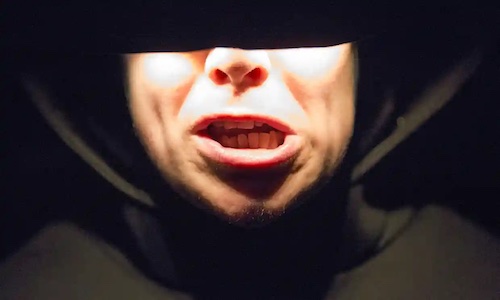
Not I is a notoriously intense Samuel Beckett play that’s delivered at speed. It’s a monologue that’s performed in the dark with just a light on the mouth.
The more I read that play, the more it deeply resonated with my lived experience. We identified and claimed Mouth as a disabled character and understood her experiences from that perspective.
We made a show that demonstrated how you could make an intense theatrical performance a relaxed, accessible experience without reducing its intensity. It was a bilingual performance in English and British Sign Language. It pushed me as a performer in a way that I never expected.
You’ve made multiple appearances on TV to discuss Tourette’s. What was your favourite TV appearance and why?
Lots of them are standard but still interesting to do. To have opportunities to talk about my experiences feels powerful.
Russell Howard’s Good News stands out because of the approach that focused on humour, creativity and joy, rather than all the difficult things. There was no tragic violin music at any point.
It’s interesting because I did an interview with The One Show at a similar time and that took a much more traditional narrative around how disabled people are talked about, despite our best efforts to change it.
Then a week later I did Russell Howard’s Good News and loads of people engaged and watched because it was funny, interesting, and joyful. A lot of that is because Russell was a generous interviewer.
I enjoyed the fact that it demonstrated there is value and interest in – not just following the established ways that we talk about and present disability – but we can do it differently and make it better, stronger and funnier.
Do you have any future projects lined up in 2022?
I’m particularly excited about a project that we’re working on called Journey To A Better World, in which for the last two years, I talked about my experience of shielding and described lockdown as like being in a spaceship and me and my support workers were the crew. We imagined my home as a spaceship in this uncertain uncharted long journey.
So Journey To A Better World takes that idea and is going to be made into a fully accessible spaceship that disabled and non-disabled people can board to explore our journeys over the last two years. It’s also a chance to discover where we want to go next and to ask how can we set a course for a better world and what do we need to do?
It’ll be performances, activities and silliness. We’ll be landing the spaceship in Germany in July, and hopefully, we’ll be landing it in other places across the UK as well.
View this post on Instagram
What advice would you give to other people living with Tourette’s syndrome?
There’s no right or wrong way to live your life and to live with a complex condition. For me, learning about Tourette’s and practising and developing the confidence and language to talk about my experiences has been powerful.
Connecting with other people – who have Tourette’s or other impairments – makes you feel collective and part of the community of disabled people who are shaping the world.
Learn about the social model of disability, which says that it’s normal for bodies and minds to work in different ways. Our bodies are not the problem, the problem is non-accessible environments and attitudes.
I think that there’s no age too young to teach people about that way of thinking. My four-year-old niece often takes that approach. She’s not interested in trying to make me walk again, but she is interested in how we can play together in the playground.
For families raising any disabled child, it’s natural to worry about the future, but I would focus on building skills and connections now because those are things that are going to be the most powerful and useful for them as they grow older.
You can find out more about Jess Thom by visiting her website Touretteshero and following her on Facebook, Twitter, Instagram and YouTube.
Interview by Emma Purcell
Featured Image by Andy Parsons
LATEST NEWS ABOUT JESS THOM
Updated 9 August 2023
Tourettes Hero will not attend the Edinburgh Festival 2023
Jess Thom on Edinburgh Festival and Accessibility
Last year, Jess Thom expressed her complex feelings about the Edinburgh Fringe Festival, especially as a disabled and Clinically Extremely Vulnerable (CEV) artist. She shared her thoughts in a detailed post titled Fringe Feelings. While there’s a significant presence of disabled-led work at this year’s festival, Jess still doesn’t feel it’s safe for her. The feelings of missing out and being left behind remain strong.
Last year I wrote about my complex feelings on @edfringe as a disabled & CEV artist: https://t.co/0NStus0GkG Loads of great disabled led work is at this years festival but it still doesn’t feel safe for me & the feelings of missing out & being left behind are still strong too 1/6
— Touretteshero (@touretteshero) August 4, 2023
In a series of tweets on August 4, 2023, Jess delved deeper into her concerns:
- Accessibility Stats: Jess revisited the stats on access performances based on the @edfringe website. She noted that wheelchair access has decreased by 7%, dropping from 63% to 57%. While there’s added information about accessible toilets, the percentage drops to 43% if she wishes to watch a show and use the toilets.
- Performance Accessibility: The number of relaxed performances has decreased from 3% to 2.6%. For wheelchair-accessible relaxed performances, it’s just 1.9% of all shows. Captioned performances saw a minor increase from 2.2% to 2.3%, but audio-described shows dropped from 0.5% to 0.4%.
- Online Shows: Last year, 2.5% of shows were available online. This year, it’s reduced to 1.3%. Jess pointed out that online availability isn’t treated as an access requirement. She also couldn’t find any information on socially distanced performances or COVID-related access for shows.
- Personal Feelings: Jess expressed her desire to be in Edinburgh but highlighted the significant risks to her health, energy, and confidence. She wishes for COVID to be recognised as the long-term access barrier it is and hopes for faster progress in ensuring equal access to the entire program.
- A Message to All: Jess sends love and solidarity to anyone else feeling left behind or frustrated by the slow pace of change. She urges those in power to prioritise disability culture and access.
Jess Thom’s tweets emphasise the importance of inclusivity and accessibility in events like the Edinburgh Fringe Festival. Her voice resonates with many who hope for a more inclusive future in the arts and beyond.
Jess Thom at “Embark on ‘Journey to a Better World’ with Touretteshero” this September 2023
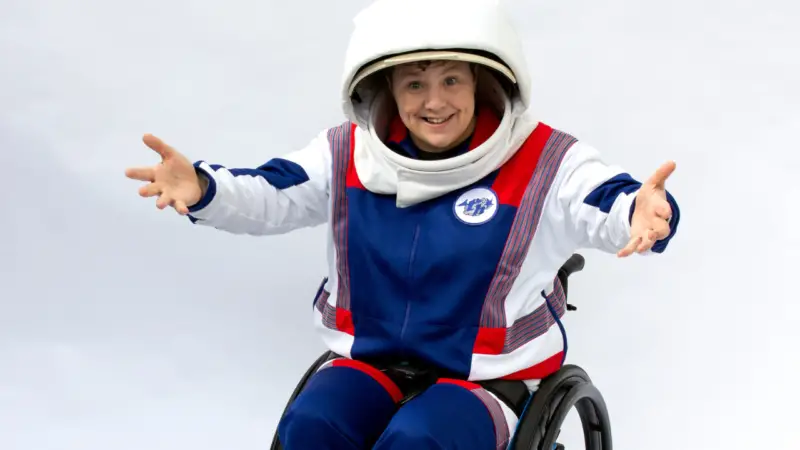 In an upcoming event titled ‘Journey to a Better World’, scheduled from 2nd to 3rd September 2023 at The Cube, Fairfield Hall, Croydon, Jess Thom of Touretteshero is gearing up to lead a transformative experience. As the Co-Artistic Director of the renowned disabled-led arts organisation, Jess will be at the forefront of this immersive event. The venue will metamorphose into a spaceship, offering attendees a series of captivating encounters with artists and activists. Jess’s vision emphasises inclusivity, ensuring the event is accessible to everyone, even those who can’t attend in person. Drawing from her unique perspective as a Tourettes advocate and artist, Jess aims to guide participants on a collective journey towards a more inclusive and understanding world. Read more about the event here.
In an upcoming event titled ‘Journey to a Better World’, scheduled from 2nd to 3rd September 2023 at The Cube, Fairfield Hall, Croydon, Jess Thom of Touretteshero is gearing up to lead a transformative experience. As the Co-Artistic Director of the renowned disabled-led arts organisation, Jess will be at the forefront of this immersive event. The venue will metamorphose into a spaceship, offering attendees a series of captivating encounters with artists and activists. Jess’s vision emphasises inclusivity, ensuring the event is accessible to everyone, even those who can’t attend in person. Drawing from her unique perspective as a Tourettes advocate and artist, Jess aims to guide participants on a collective journey towards a more inclusive and understanding world. Read more about the event here.
The event “Journey to a Better World” hosted by Touretteshero at The Cube, Fairfield Hall, emphasises inclusivity and accessibility.
- BSL Interpreters: This indicates that the event is suitable for those who are deaf or hard of hearing.
- Relaxed Event: This typically means that the event is suitable for individuals with sensory sensitivities, autism, or learning disabilities. It’s an environment where attendees can move around, make noise, or leave and re-enter as needed.
- Step-free Access: This ensures that the venue is wheelchair accessible, making it suitable for individuals with mobility impairments.
- Audio Describers: These are available to support attendees with visual impairments, offering guiding, touch tours, and on-demand descriptions.
- Wellbeing Hub and Breakout Space: This space can be beneficial for attendees who might need a quiet space to retreat to, which can be especially useful for those with anxiety, sensory sensitivities, or mental health conditions.
- Easy-read Information Pack: This suggests that the event is also considering attendees with learning disabilities or those who benefit from simplified information.
FAQ JESS THOM
What is Tourette’s syndrome?
Tourette’s syndrome is a neurological condition characterized by involuntary tics and vocalizations. Jess Thom describes her tics as a mixture of movements, noises, and words.
How did Jess Thom become a Tourette’s hero?
Jess Thom co-founded the Tourette’s Hero project to share the creativity and humour that can come with Tourette’s syndrome. Through this project, she has been able to reach a wider audience and challenge misconceptions about the condition.
What are some of the challenges faced by Jess Thom due to her condition?
Jess Thom faces challenges such as involuntary tics, which can sometimes be intense and exhausting. However, she has turned these challenges into opportunities by using them as a source of creativity in her work.
How does Jess Thom describe her tics?
Jess Thom describes her tics as a mixture of movements, noises, and words. They are involuntary and can be unpredictable.
What is the ‘Backstage in Biscuit Land’ show about?
The ‘Backstage in Biscuit Land’ show is a performance that shares Jess Thom’s experiences with Tourette’s syndrome. It aims to challenge societal norms and promote inclusivity.
How has Jess Thom’s work been received by the public and critics?
Jess Thom’s work has been widely acclaimed by both the public and critics. Her performances and the Tourette’s Hero project have been recognized for their impact on promoting understanding and inclusivity.
What is the mission of the Tourette’s Hero project?
The mission of the Tourette’s Hero project is to challenge societal misconceptions about Tourette’s syndrome and to celebrate the creativity and humour that can come with the condition.
Will Jess Thom be attending the Edinburgh Festival 2023?
No, Jess Thom will not be attending the Edinburgh Festival 2023. She has expressed concerns about the festival’s accessibility and does not feel it’s safe for her to attend, especially as a Clinically Extremely Vulnerable (CEV) artist.
What are Jess Thom’s views on the Edinburgh Festival’s accessibility?
Jess Thom has expressed concerns about the decreasing accessibility stats at the Edinburgh Festival. She noted a drop in wheelchair access, a decrease in relaxed performances, and a reduction in online show availability. Jess wishes for COVID to be recognised as the long-term access barrier it is and hopes for faster progress in ensuring equal access to the entire program.
When is Jess Thom Tourettes Hero’s next show?
Jess Thom’s next show is titled ‘Journey to a Better World’, scheduled from 2nd to 3rd September 2023 at The Cube, Fairfield Hall, Croydon. She will be leading this immersive event, emphasizing inclusivity and accessibility.
What accessibility features are available at the ‘Journey to a Better World’ event?
The event offers BSL interpreters for the deaf or hard of hearing, a relaxed environment suitable for those with sensory sensitivities, step-free access for mobility impairments, audio describers for the visually impaired, a well-being hub for those needing a quiet space, and an easy-read information pack for those with learning disabilities.
How is Jess Thom changing the narrative for disabled people?
Jess Thom is changing the narrative for disabled people through her art, performances, and the Tourette’s Hero project. She aims to challenge societal norms and create a more inclusive environment for everyone.
More on Disability Horizons…